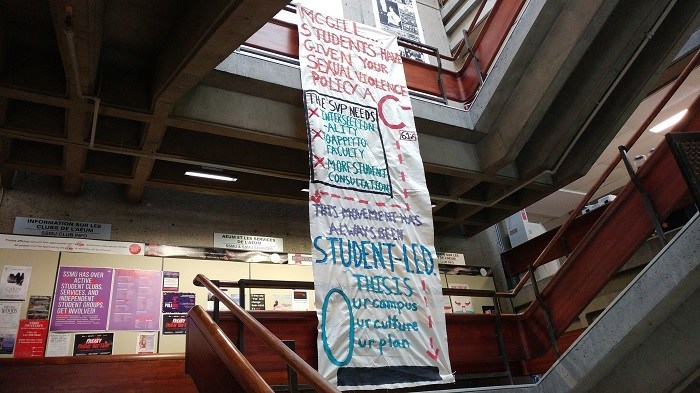The McGill administration missed the Jan. 1 deadline set by the Quebec government to adopt an updated sexual assault and violence policy. The deadline was part of Quebec’s Bill 151, which was passed in Dec. 2017 and requires all higher education institutions to revise their sexual assault and violence policies in accordance with a new set of regulations.
McGill’s Policy Against Sexual Violence was ratified in 2016 and is currently under revision to reflect the provincial government’s new requirements. As it stands, McGill’s policy fails to adhere to some of the requirements of Bill 151, such as the existence of a standalone policy and clearly-defined regulations regarding professor-student relationships.
Principal and Vice-Chancellor Suzanne Fortier denied that McGill had missed the deadline and suggested that media coverage claiming otherwise lacked nuance.
“McGill had a sexual violence policy in 2016, so we didn’t miss the deadline,” Fortier said. “Our schedule didn’t work perfectly with Quebec, [and], through our schedule, we’re going to look at what adjustments we need to make to be 100 per cent in agreement with the Quebec policy. In fact, we were the first to [have a policy] in 2016, so I think the journalists in some of these cases did not do the full work of really looking at the facts, but we did not miss the deadline in terms of the big policy.”
According to Our Turn, a student-led initiative to end sexual violence on university campuses, McGill’s current policy is far from sufficient. In their rating of over 60 Canadian post-secondary institutions based on criteria such as accessibility, scope, and intersectionality, McGill’s policy received a grade of C-. Its poor grade is due, in large part, to the fact that, rather than being a self-contained document, the policy refers to other regulations, such as disciplinary procedures outlined in the Student Code of Conduct, which are not specific to sexual assault.
Connor Spencer, former Vice-President (VP) External for the Students’ Society of McGill University (SSMU) and national chair of Students for Consent Culture Canada, expressed disappointment with the lack of enforcement on the part of the province. In addition to McGill, L’Université du Québec à Montréal (UQÀM) and 26 of Quebec’s 48 CEGEPs have yet to provide an updated policy to the Quebec government.
“There is an assumption of good faith that is not warranted on the part of the province,” Spencer said in an interview with The McGill Tribune. “We actually need to implement a robust oversight mechanism to ensure that there’s a way for students to report their universities for being in violation of either provincial legislation or their university’s own policies.”
Spencer added that McGill’s failure to introduce a more comprehensive policy in spite of active student mobilization suggests a concerning trend of treating measures against sexual violence as boxes to be checked, rather than genuinely attempting to change the circumstances which allow for sexual assault to occur.
“McGill’s unwillingness to engage with student criticism and concerns […] over their policy against sexual violence […] points to the fact that, even though supports have gotten better over the past couple of years for student survivors, […] the underlying willingness to change the rape culture that exists on campus from upper administration is not there,” Spencer said.
Yasmine Mosimann, who works for SSMU as a sexual violence mobilization and advocacy commissioner, emphasized the importance of implementing the proposed changes quickly.
“I will say [that] a concrete and simple measure that McGill should be undertaking is listening to its students,” Mosimann wrote in an email to The Tribune. “It is often the case that there is a great discrepancy between the final reports and what students have said. Yes, there is a review committee in session, but these changes need to be made in real time. Individuals will face sexual and gendered violence between the January deadline and the several months it will take for the reviewed policy to be completed, presented, and voted upon, and not having a strong policy for [those students] is unacceptable.”








